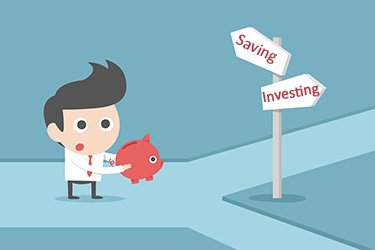Is there a paradigm shift from saving to investing? A cursory analogy will vindicate the premise.
The overwhelming importance of money in human affairs cannot be undermined in that virtually every human activities hinge on money. Imagine living a life without money. While everyone strives to make more money, it is important to understand that a secured financial future is the goal of every attempt to make money. Money is needed for varied purposes, to get a house, buy a car, pay for education, for marriage and the list goes on.
However, there is a school of thought that anchors its belief system to the fact that the trend of having a secured financial future is to "invest" and not to "save". And on the other hand, another group of thought based its financial security on "savings". I found this issue intriguing, hence my desire to really dig into it and probably take a stand. I hope you find this helpful.
First of let's see how we can elucidate the following terms. Saving and investing.
 (source)
(source)
what saving entails.
Saving entails intentionally putting aside a certain amount of money to be used for a specific purpose. Either for purchases or emergencies. In saving, the time frame is usually minimal, and it makes the money readily available when needed. For example, a parent might put aside a certain percentage of his money, at every month end to fund their holiday trip overseas.
Important elements to note about saving.
- Saving account tells you the level to which your money has reached or gotten to, Which helps you know your worth financially.
- The returns on savings are low and often you might lose some part of your money as a result of bank charges. The maintenance fee is pretty low.
- To some extent you don't stand a chance of losing your money.
- In saving, the product is virtually liquid, that is, your money is always available and you can get it any time you need.
- You don't need a special skill to know how to save. Everyone can save.
The embodiment of investing.
Investing to some extent is similar to "saving". In simple terms, investing means saving money for a long period (long-term goal), often for 5 years and above. Investing can take the form of bonds, stocks, exchange-traded funds(ETFs), mutual funds, etc.
Important elements to note about investing.
- There's a high risk of losing your money. That's why it is important to understand and have full knowledge of what you're investing in.
- In investment, products(stocks, bonds, ETFs,) can be converted or transferred into cash on weekdays.
- Having different stocks will help one stay afloat inflation and one's purchasing power will not be affected.
- All things being equal, if the market is not favorable, one may end up not getting his initial investment.
- You will not have access to your investment for a long time. Say 5-7years.
- You will need a special skill to invest in. or you hire an expert to help you.
- The return on investment is generally higher.
What savings and investment have in common.
Like I said earlier that saving and investing are almost the same. So let's look at some similarities.
Savings and investing entail putting aside money for future use.
Also, financial institutions are involved in both savings and investing. A saver can open a savings account at a bank while an investor can have an account with an independent broker. An example is Charles Schwab.
Significant differences -savings and investing.
- Time Frame.saving is basically for a short duration. say 1-4 years interval. Meanwhile, investing spans a period of 5-7years intervals.
- Getting access to money. in savings, money can be accessed at any time but it's the other way round in investment.
- Risk level there's a higher risk of losing money in investment. One can not lose virtually everything but in saving, your money in a reputable bank is safe than your home hence the risk of losing your money is reduced.
- Returns bank fixed deposits can earn one an interest of 12% on average. Meanwhile, On savings, The return is very low compared to investing which is pretty high. Investing in quality products yields higher compared to saving.
Choice -which is better: saving or investing?
The first thing to note about saving and investing is to define your purpose. which is knowing what you want to do with your money either to save or invest. Remember that you must put some factors in place as stated above. For instance, if your goal is for the short term you must consider emergencies and urgent needs to spend money. If it's a long-term goal, you must put issues like inflation and changes in needs into consideration. Remember, that we invest for the future and save for the present.
In conclusion, neither saving nor investing is better it all depends on what a person seeks to achieve in life currently or in the future. And the right time to either save or invest is now.
Thanks for stopping by.